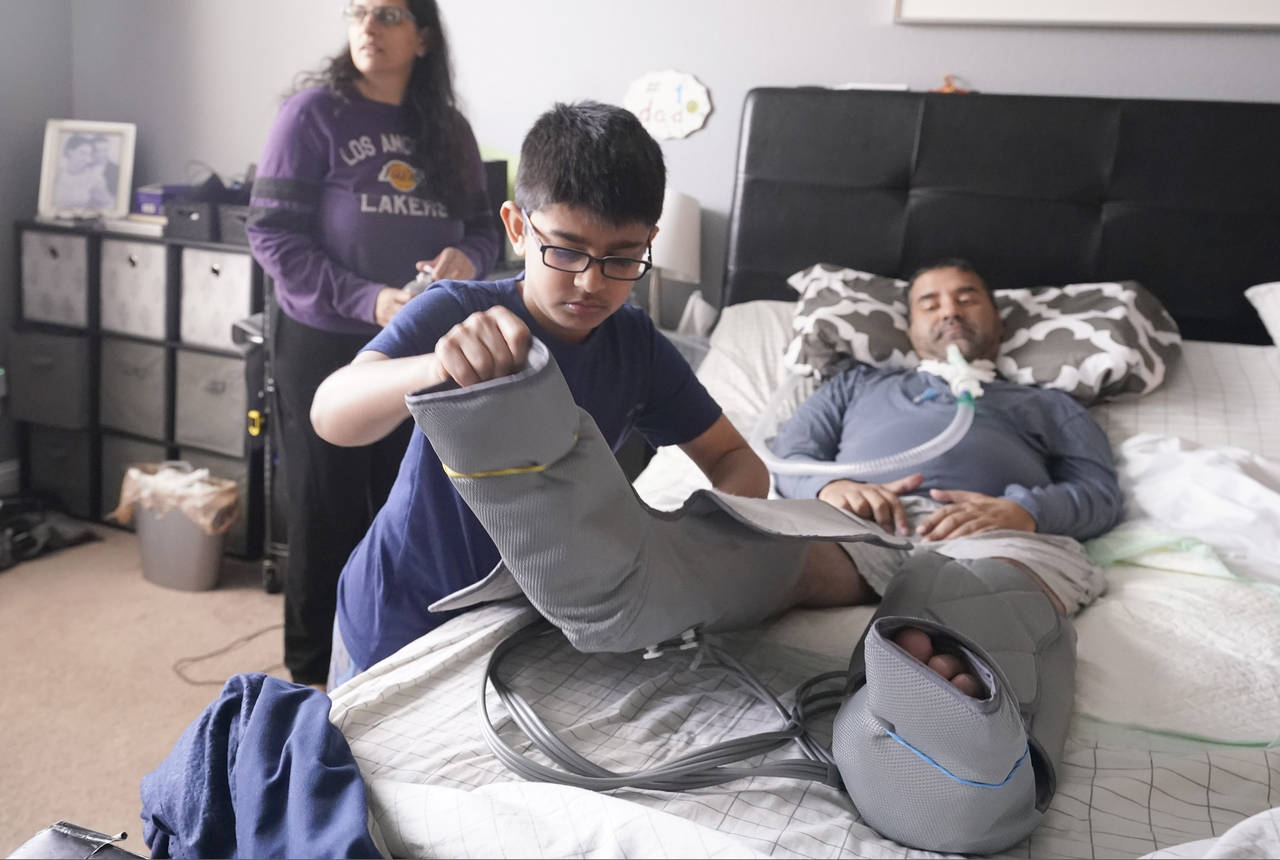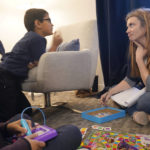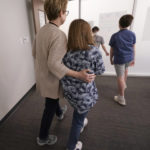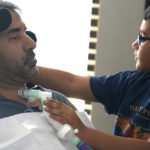Young caregivers ‘exist in the shadows,’ offer crucial help
May 30, 2022, 10:07 AM | Updated: May 31, 2022, 10:54 am

Ronan Kotiya, 11, removes a compression leg sleeve from his father Rupesh Kotiya as his mother Siobhan Pandya looks at their home in Plano, Texas, Sunday, April 10, 2022. Ronan helps care for his father who suffers from ALS and is dependent on a ventilator and around the clock care. Millions of Americans with serious health problems depend on children ages 18 and younger to provide some or all of their care at home. An exact number is hard to pin down, but researchers think millions of children are involved in caregiving in the U.S. Ronan helps care for his father who suffers from ALS and is dependent on a ventilator and around the clock care. Millions of Americans with serious health problems depend on children ages 18 and younger to provide some or all of their care at home. An exact number is hard to pin down, but researchers think millions of children are involved in caregiving in the U.S. (AP Photo/LM Otero)
(AP Photo/LM Otero)
PLANO, Texas (AP) — Ronan Kotiya leans over his father, fingers wrapped around a plastic tube he’s about to slide from a tracheostomy hole in dad’s neck.
“3, 2, 1, go,” the 11-year-old says as he removes the tube. His mom slips a padded neck brace on her husband and lifts him into a sitting position on their bed.
Ronan’s 9-year-old brother, Keaton, waits nearby, ready to connect their dad, Rupesh Kotiya, to a portable ventilator.
“Ronan, do you want to suction daddy’s mouth and then get ready to go?” Siobhan Pandya asks after her son steers dad’s power wheelchair into the living room of the family’s Plano, Texas, home.
“Thanks buddy, good job,” a robotic voice crackles from a tablet Kotiya uses to speak.
So begins another weekend for the brothers — two Harry Potter fans with mouths full of braces, a knack for building with Legos and some heavy caregiving responsibilities.
Their 46-year-old father has Lou Gehrig’s disease, a fatal illness that has taken his ability to speak and walk. A ventilator helps him breathe. He uses eye-tracking software on the tablet to say things, blinks to indicate yes or moves his mouth side to side for no.
As many as 10 million children in the U.S. may provide some form of care at home, according to researcher Melinda Kavanaugh. Some kids are the only caregivers patients have, while others fill in when visiting nurses or other help is not available.
These children help cancer patients, military veterans, grandparents with heart disease or autistic siblings. They’re often too young to drive, and their work frequently goes unnoticed outside the home.
“They exist in the shadows,” said Kavanaugh, an associate professor of social work at the University of Wisconsin-Milwaukee.
Kavanaugh and other researchers say the number of young caregivers is growing, and they need support. Caregiving is a task that children like Ronan and Keaton take seriously and something that their mom hopes will shape them into empathetic, strong young men.
But getting there first involves a daily struggle to balance being a kid with living in a very grown-up world.
Ronan grabs a handful of toy cars and kneels on a clinic floor at Texas Neurology in Dallas.
His opponent, a freckle-faced boy named Charlie, waits a few feet away, ready to smash cars together. First to tip over loses.
“Y’all are savages,” says Evie, a skinny 9-year-old prone to spontaneous dance.
The children have gathered in the clinic on a sunny Saturday afternoon to learn more about caring for people with Lou Gehrig’s disease, or amyotrophic lateral sclerosis. These seven children — ages 8 to 12 — help care for a parent or grandparent with ALS, an illness that destroys nerve cells in the brain and spinal cord that control muscle movement.
Kavanaugh lined up several specialists to teach as part of a program called YCare that she has taken to several cities. A dietitian showed the kids how to make food the right consistency so patients don’t choke. A respiratory therapist explained the important parts of a device that helps people cough to clear mucus.
In one training session, speech therapist Heather Gallas discusses eye tracking technology that allows patients to spell out words and communicate with a tablet.
She holds up a laminated letter board and asks the kids to try. Evie silently points to every letter in her name.
Then Keaton takes a turn.
S-U-C-T-I-O-N.
Gallas pauses, “Is that something your dad needs a lot?”
Keaton nods.
Aside from providing training, one of Kavanaugh’s main goals was to simply let the young caregivers meet. Loneliness is a problem, one that grew worse during the COVID-19 pandemic.
“A 10-year-old at school is not going to talk about toileting or bathing their parent, but they are going to talk about it here,” Kavanaugh said.
In the afternoon, the kids trade email addresses and phone numbers, and The ALS Association’s Texas chapter starts making plans for a pizza party reunion this summer.
Doctors diagnosed Rupesh Kotiya with ALS in October 2014, a month before his boys turned 4 and 2. Ronan and Keaton have no memories of him without the illness.
They started pitching in with care a few years ago, first by wiping away their dad’s tears or propping up his head during car rides.
Then they started helping Pandya move their father in and out of bed or onto the toilet. They pull down his shorts and underwear while she lifts him to the seat.
They also put on his socks and shoes, help change his shorts, crush medicines or mix mouthwash with water.
Pandya, a senior director with the skin care and cosmetics company Mary Kay, has daytime and evening caregivers for her husband during the week. But she has no paid assistance overnight or on the weekends, so the boys have had to step up.
“To be honest, they’re doing tasks some adults don’t want to do,” Pandya said.
Pandya tries to balance the boys’ caregiving with activities that offer some normalcy. Keaton takes tennis lessons and coding classes. Ronan plays striker on a youth soccer team.
Soccer balls, frisbees and basketballs lay scattered around the Kotiyas’ small suburban backyard.
Both boys play piano, and Keaton paints prolifically. Stacks of his work fill shelves in their upstairs playroom.
Ronan, who wrote a short book about his dad, sees his father’s fight against ALS as a superhero battle. He and his brother are among the many weapons used.
Keaton shows his frustration sometimes, especially with the amount of care his dad needs.
“He’s been having a few accidents these last few days,” Keaton said. “One time he went three times that day, and I was really looking forward to doing something that day, but I couldn’t do it because … yeah.”
In the end, Pandya sees the boys’ caregiving as a positive. She hopes Ronan and Keaton eventually look back and recognize how much they gained by helping someone they love.
“If you’re caring for somebody that … has a clock ticking, then you don’t want to take that time away,” she said. “Being able to wipe their tears or wipe their mouth or hold their hand, those are some of the memories that they’re going to cherish.”
The boys know their dad is getting worse.
Keaton says it is getting harder for his dad to blink. He remembers one recent night when Rupesh slept for over 12 hours and then took a long nap the next afternoon.
“I’m like, should I be worried?” he said.
Frustration, devotion and heartbreak all swirl around in their still-developing brains.
Therapist Sarah Sutton recently had the boys draw up bucket lists of things they want to do with their dad.
Keaton shares a love of food with Rupesh, so he asked for a trip to Italy. The family found a more practical alternative: a drive to an Italian food market and restaurants in nearby Dallas.
Sutton has seen the boys regularly for a few years. She’s been trying to get them to recognize and understand all the emotions hitting them so they don’t keep everything bottled up.
When they visit, she also tries to give them a fun activity they can control. Play — kids being kids — is crucial for development.
“We play out conflict. We play out resolution. We play out the stories that are going on inside us,” Sutton says.
During a recent visit, Sutton breaks out the board game Candy Land. She tells the boys that each colored card in the game will represent an emotion, and they get to decide which ones.
Then they draw cards with the idea of discussing whatever feeling comes up.
Sutton also tries to nudge the boys into talking about their dad. They deflect, focusing instead on a painting on her wall. Then the singer Rick Astley comes up.
Keaton pretends to be a therapist. “Do you have a girlfriend?” he asks.
“No, you’re an awful therapist,” Ronan replies.
Ronan only allows at one point that his dad is “doing good.”
Sutton draws double green in their game. That represents disgust or unfairness.
“I think it’s unfair that terrible things happen to people,” she says.
The boys avoid the bait. They eat Hershey’s Kisses. They trade scribbles on an Etch A Sketch. Someone farts. The session devolves into fits of giggles.
“Have you guys been laughing like this all day?” Sutton says. “Laughter without any anger or fighting is so wonderful.”
When the session ends, Sutton’s floor is strewn with candy wrappers.
The boys head for their mom’s waiting van so they can return home and set up a living room campout.
Pandya started letting Ronan and Keaton roll out sleeping bags on their living room rug each weekend during the pandemic. It began as a treat when they couldn’t go anywhere else.
Rupesh started using a ventilator just before the pandemic hit. The boys stayed home from school for 17 months as Pandya tried to keep everyone from catching the virus.
She also has an ulterior motive in allowing the campouts: Having the boys sleep next to their parents’ bedroom instead of upstairs in their shared room makes it easier to summon their help.
The boys may have to get trash bags and gloves if their dad has an accident during the night.
Before they set up camp, the boys change into pajamas, and the family settles in the living room to watch the kids’ show “Legends of the Hidden Temple.”
Ronan and Keaton curl up on a couch and loveseat while Pandya changes her husband’s shirt and pours medicine into his feeding tube. The ventilator hums.
The show ends, and Keaton takes his turn to steer dad back to the bedroom, where Pandya lifts him onto the mattress.
Keaton uses a long wand to suction saliva pooling in his dad’s mouth.
Ronan then holds his father on his side as Pandya straightens her husband’s shirt and shorts.
After that, the boy pats his dad softly on his back and lays him flat.
Pandya finishes getting her husband ready for bed while Ronan and Keaton scamper back to the living room.
There, they sprawl on top of sleeping bags, munching chips and candy as they squeeze in a little more TV before crawling inside to sleep.
___
AP video journalist Shelby Lum contributed to this report. Follow Tom Murphy on Twitter: https://twitter.com/thpmurphy
___
The Associated Press Health and Science Department receives support from the Howard Hughes Medical Institute’s Department of Science Education. The AP is solely responsible for all content.
Copyright © The Associated Press. All rights reserved. This material may not be published, broadcast, rewritten or redistributed.







































